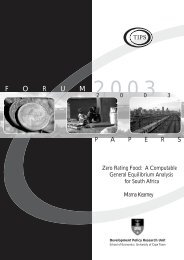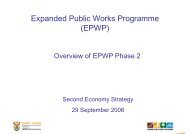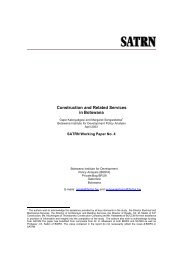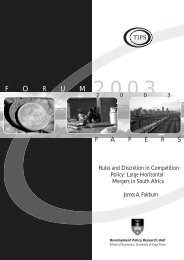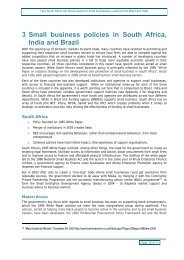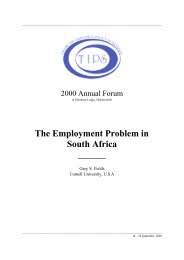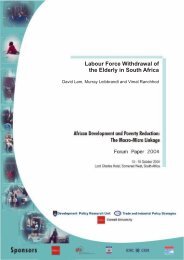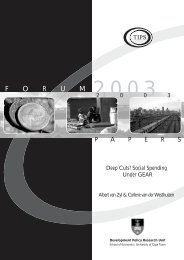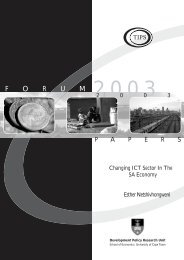(AsgiSA) Annual Report 2008 - South African Government Information
(AsgiSA) Annual Report 2008 - South African Government Information
(AsgiSA) Annual Report 2008 - South African Government Information
Create successful ePaper yourself
Turn your PDF publications into a flip-book with our unique Google optimized e-Paper software.
Accelerated and Shared Growth Initiative for <strong>South</strong> Africa<br />
ANNUAL REPORT<br />
<strong>2008</strong><br />
• There is often a wide gulf in expectations between small producers who are currently excluded from<br />
wider markets, and the practices and expectations in existing value chains. Intermediary entities are<br />
often needed to bridge the gap or facilitate access. Such intermediation can take a range of forms,<br />
but needs to be supported as a critical part of strategies for the sector.<br />
3.4.6 New market-based employment is likely to be largely urban, where “urban” includes small<br />
towns and dense settlements<br />
This requires the following:<br />
• efficient and inclusive cities and towns<br />
• alignment of social, economic, infrastructure and land use planning to increase efficiency, ”crowd in”<br />
economic opportunities and promote dynamism, including within residential neighbourhoods<br />
• upgrading and transforming informal settlements is vital to social and economic inclusion in urban<br />
areas<br />
• the release of well-located land and planned development to ensure access to services is necessary<br />
to ”get ahead” of the ongoing influx into urban areas and facilitate such entry.<br />
3.4.7 Creating rural employment will require a stronger catalytic role from the State to achieve results,<br />
as part of a wider strategy for rural development and agrarian reform<br />
• Strategies to develop a smallholder sector and strengthen subsistence agriculture face many challenges<br />
and start off a low base; but their potential impact on poverty and on rural employment<br />
makes this investment – and the associated risk – imperative.<br />
– Success in this area requires a strong focus on institutional support that creates economies of scale,<br />
and access to business services and markets.<br />
– Redistributive land reform needs to promote greater access for smallholders, and opportunities for<br />
successful black farmers to expand beyond former bantustans, where they have not yet managed<br />
to do so.<br />
– Increases in the use of arable land in former bantustan areas will be assisted by support to rental<br />
markets for land while longer-term tenure issues are resolved.<br />
– A new generation of water harvesting and irrigation support is needed.<br />
– Incentivise co-ordination, co-operation and facilitation of access to value chains and markets e.g.<br />
through commodity associations and other forms of economic co-operation is needed.<br />
• Employment in the existing commercial agricultural sector also matters. Land claims that affect whole<br />
value chains – including jobs across the chain – need to be urgently resolved, and advantage taken<br />
of the scope to take transformation of ownership and access beyond land alone in this process.<br />
• Human-capital development and the provision of basic services in rural areas need to form a key part<br />
of a rural employment strategy.<br />
• In a context of increasing constraints on natural resources, these take on new value. This in turn introduces<br />
potentially significant new opportunities for rural employment, from the implementation of<br />
payment systems for environmental services. This wide heading includes strategies related to water,<br />
waste, energy and the scope to earn carbon credits from action in these areas; realising this potential<br />
depends strongly on government playing a catalytic role – or the role of a developmental state.<br />
17



